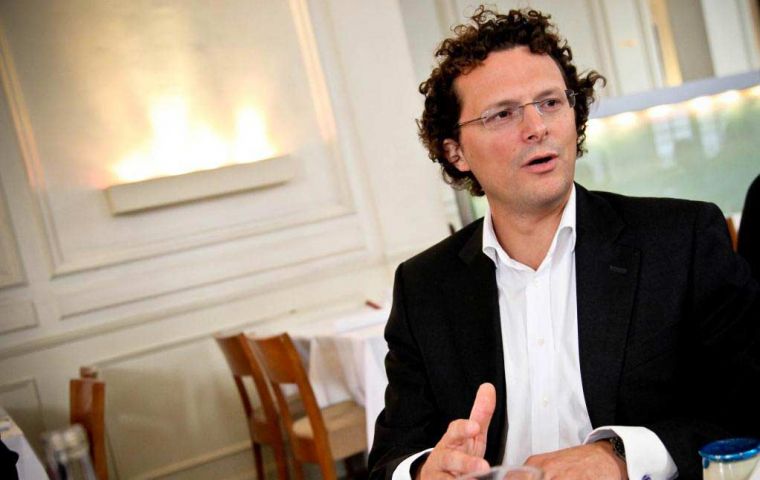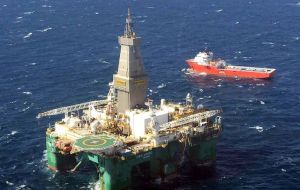MercoPress. South Atlantic News Agency
Falklands’ black gold rush might at last be a reality
 Rockhopper’s Sam Moody says the project will “transform the economy” of the islands (Times photographer Nicky Ray)
Rockhopper’s Sam Moody says the project will “transform the economy” of the islands (Times photographer Nicky Ray)  A gaggle of Aim-quoted explorers nicknamed the “sheikhs of the South Atlantic”, Desire Petroleum, Falkland Oil and Gas, Argos Resources, Borders & Southern and Rockhopper
A gaggle of Aim-quoted explorers nicknamed the “sheikhs of the South Atlantic”, Desire Petroleum, Falkland Oil and Gas, Argos Resources, Borders & Southern and Rockhopper  Navitas, CEO Gideon Tadmor, was an influential figure in the opening up of the eastern Mediterranean as a big new source of gas
Navitas, CEO Gideon Tadmor, was an influential figure in the opening up of the eastern Mediterranean as a big new source of gas By Dominic O’Connell, The Times- Head north from the Falkland Islands, across the South Atlantic waves where albatross wheels and whales sound, and you pass over what could be a big new oil province — a significant source of hydrocarbons controlled not by sheiks or oligarchs, but by the United Kingdom.
The Falklands might seem an odd candidate to become an energy powerhouse. The likely presence of commercial quantities of oil has been known for decades, yet successful development has always seemed improbable. The Islands were too remote, the weather too inhospitable, the cost too high.
Now, however, the odds are shortening. The Sea Lion field, which has been an on-again, off-again prospect since oil was discovered there 12 years ago, is on again. Rockhopper, the exploration venture that found it, has struck a development deal with Navitas, an Israeli oil company with a reputation for bringing difficult prospects into production.
Its chief executive, Gideon Tadmor, was an influential figure in the opening up of the eastern Mediterranean as a big new source of gas, and the company recently completed a deal to develop the Shenandoah field in the Gulf of Mexico, which had previously been discounted for being in water too deep with well pressures too high.
“We are closer than we have ever been to it actually happening,” says Ashley Kelty, senior oil and gas analyst at the stockbroker Panmure Gordon, who made the trip to the Islands to examine the project when it last looked likely to happen.
“It will transform the economy of the Falkland Islands,” says Sam Moody, Rockhopper’s chief executive. “And it is big enough to make a difference to the security of the UK’s energy supply.”
Argentina, which has denounced oil and gas exploration in Falklands waters as illegal because of its territorial claim to the Islands, remains implacably opposed. Environmental campaigners have in the past also objected, although a local wildlife charity is not calling for a blanket ban.
If all goes according to the Rockhopper plan, and there are regulatory hurdles still to overcome, including a sign-off in Westminster, a final investment decision could be taken in two years’ time.
The Falklands has been the next big thing in oil several times in the past. Industry giants, including Shell, explored without luck in the 1990s, and there was a flurry of interest around 2010 when a rapidly-rising oil price sparked a prospecting rush.
A gaggle of Aim-quoted explorers nicknamed the “sheikhs of the South Atlantic” — including Desire Petroleum, Falkland Oil and Gas, Argos Resources, Borders & Southern and Rockhopper — raised money from investors eager to believe that riches awaited. It was a febrile atmosphere; comments on investor bulletin boards at the time showed many who bought the shares believed Britain’s willingness to fight to reclaim the Falklands from Argentine invasion in 1982 was proof enough that large quantities of oil would be found.
After that rush of activity, however, the oil price dropped and market interest fell. Rockhopper, a tiny company headquartered in a Wiltshire farmhouse, is one of those to have stayed the course, and has the license not only for Sea Lion but other potential fields.
Moody, who is Rockhopper’s co-founder as well as its chief executive, first got involved in 2004 after having conversations with Richard Visick, the one-time owner of Weddell Island, the third-largest in the Falklands. “The acreage that Shell and others had been exploring was coming off license — it was open for someone else to come in. Richard said ‘I think there is an opportunity here’, and we set it up together.”
In 2010 Rockhopper struck oil on Sea Lion, not far from where Shell had been working more than a decade earlier. “They missed it only by about 1,000 meters,” Moody says. The discovery, which is estimated to contain at least 500 million barrels, made Rockhopper a potential target for other oil explorers hungry for promising prospects. It held talks with Cairn Energy before striking a development deal with Premier Oil, a London-listed company with interests in the UK, Mexico and Asia.
Premier paid US$ 231 million upfront for a 60% stake, with the promise to pay another US$ 770 million of development costs. The partners predicted that oil would flow by 2017. It never came to pass, though. The oil price fell, and while Premier and Rockhopper spent money on studies and engineering work on how to bring the field into production, actual development was shelved.
Premier was distracted by problems at other fields and a shaky balance sheet. In March last year it merged with another medium-sized oil company, Chrysaor Holdings, with the combined company renamed Harbour Energy.
Harbour was less interested in the Falklands, and in December it withdrew, with Navitas taking its place. When the deal closes the Israeli company will take a 65% share of the field, with Rockhopper keeping 35%. Rockhopper raised US$ 10 million this month to help to fund its side of the agreement.
Tadmor, who has separate interests in film production, including the 2016 movie Norman, starring Richard Gere, said that the Israeli group had been tracking the Sea Lion field for some time. “We were interested going right back to when Premier got involved,” he said. “It is a perfect fit for us. We like situations where there are challenges, and we have a track record of making things work in difficult places.”
According to Tadmor, much of the hard work has already been done. “Premier and Rockhopper together have spent a lot of money on the development. We will refine the production concept, but basically we see this as getting an asset which is already a long way down the road.”
Navitas also brings access to an interesting source of funds: Israeli investors, who Tadmor says are eager for more access to oil and gas assets. He dismisses opposition to new oil and gas fields on climate change grounds.
“The truth is that the transition from hydrocarbons to new sources of energy is going to take much longer than people think, and in the meantime we will need new sources of oil and gas.”
He is also relaxed about Argentina’s denunciations. “We are aware of the conflict, but it is a UK territory.
“Our experience in the eastern Mediterranean makes me believe that oil discoveries are positive developments — if we do well then other oil companies, even the majors, will come to the Falklands.”
Both Moody and Tadmor are, understandably, keen to stress the impact that oil production could have on British energy security. “This could be big enough to replace all the oil imports the UK has from Russia,” Moody says.
It will also be a big deal for the Falklands economy.
The Falkland Islands government — there is a newish administration in place after elections that took place in November last year — will take a 9% royalty on each barrel produced, and will also charge corporation tax on the Sea Lion operations.
“Depending on what your assumption is about the oil price, that is a giant amount of money for the Islands,” Moody says, while Tadmor estimates that the first phase could triple the Falklands’ gross domestic product at a stroke.
In a statement, the Falkland Islands government said that it supported oil production “provided it is done to the necessary standards”. It said it was too early for definitive plans on how oil revenues would be used. “However, the Falkland Islands have significant infrastructure renewal requirements,” a spokesman said.
Esther Bertram, chief executive of Falklands Conservation, a charity that is devoted to protecting the Islands' wildlife, said that the group did not oppose all oil development but wanted additional environmental safeguards, including new laws, protection for inshore waters and funds in place for any remedial work required.
”I think it will be quite interesting to see what happens because in the recent elections many voters talked about the environment being one of the big issues for them,” she said.
While some Falkland Islanders may hope that the deal with Navitas will bring their dream of riches closer, others will remember that much has been promised before, and that much hangs on the oil price. Rockhopper and Premier calculated that the Sea Lion field had a break-even cost of about US$ 40 a barrel, well below the current US$100-plus.
“I think there is a much higher chance of it happening than at any time in recent years,” said Werner Riding, oil and gas analyst at Peel Hunt, Rockhopper’s broker. “It will have a motivated new operator in Navitas, and they should be able to finance it. It is a good-sized resource and by the time they reach the final investment decision they will have confidence on proven reserves. At a US$100 oil price it is definitely bankable.”




Top Comments
Disclaimer & comment rules-

-

-

Read all commentsThis Kind of Story just p****s off the Argentine regime ! there will be a counter claim from them crying it`s not fair.
Jul 24th, 2022 - 11:11 am +3Capish !!!!????
So much for the Argentine government's claim that the whole world supports its bogus sovereignty claim to the Falklands.
Jul 25th, 2022 - 03:15 am +3@Taken, Oh those poor Argentine Hydro Miners at Vaca Muerta can`t find any gullible investors to pump into there corrupt operation !! and another Wave of poverty sweeps over the Argentine masses 30,000,000 plus and Growing !!! Weeping Why Us !
Jul 25th, 2022 - 08:49 am +3Capizzzzzzzzz !!!!!! ???????
Commenting for this story is now closed.
If you have a Facebook account, become a fan and comment on our Facebook Page!